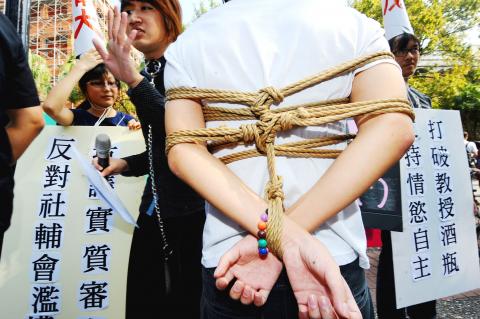Students at National Taiwan University (NTU) pushing for the establishment of a club centered on BDSM practices — which includes the erotic practices of bondage and role-playing — yesterday protested against the institution’s decision last week to block their application.
The club fell one vote short of the required nine votes from a 17-member committee made up of faculty, administrators and student representatives.
Members of the unendorsed club yesterday gathered on campus to perform live demonstrations of bondage practices in a bid to counter allegations that the practices were unsafe.

Photo: Chang Chia-ming, Taipei Times
Rope artists, the title for seasoned practitioners in the art of bondage, tied the hands of several prospective club members behind their backs in a complex array of knots.
One student, surnamed Luo (羅), said she enjoyed being firmly tied up, as it made her feel “loved,” adding that she supported activities that challenged traditional notions of sexuality.
The committee should only have the right to evaluate formal and ceremonial aspects of the organization’s application, instead of questioning the club’s activities, said the president of the group, who said he wanted to be called Lisa.
“Certain committee members used their narrow views of BDSM culture to threaten others into voting against the club,” Lisa said, adding that one of the committee members showed an obscene video clip on his mobile phone to others to discredit BDSM practices.
In response, Student Activity Division director Wu Hsiu-ling (吳秀玲) said the students should respect the committee’s decision, as the members consisted of democratically elected members, including student representatives who were vocally supportive of the application.
“The application would actually never pass a strict formal evaluation, as the club intends to allow non-student membership,” Wu said, citing regulations that restrict membership to students of the university.
Wu said she had expected the application to pass, adding that the students are welcome to resubmit their application when they are better prepared to answer the safety concerns raised by the committee.

CHANGING LANDSCAPE: Many of the part-time programs for educators were no longer needed, as many teachers obtain a graduate degree before joining the workforce, experts said Taiwanese universities this year canceled 86 programs, Ministry of Education data showed, with educators attributing the closures to the nation’s low birthrate as well as shifting trends. Fifty-three of the shuttered programs were part-time postgraduate degree programs, about 62 percent of the total, the most in the past five years, the data showed. National Taiwan Normal University (NTNU) discontinued the most part-time master’s programs, at 16: chemistry, life science, earth science, physics, fine arts, music, special education, health promotion and health education, educational psychology and counseling, education, design, Chinese as a second language, library and information sciences, mechatronics engineering, history, physical education

The Chinese military has boosted its capability to fight at a high tempo using the element of surprise and new technology, the Ministry of National Defense said in the Quadrennial Defense Review (QDR) published on Monday last week. The ministry highlighted Chinese People’s Liberation Army (PLA) developments showing significant changes in Beijing’s strategy for war on Taiwan. The PLA has made significant headway in building capabilities for all-weather, multi-domain intelligence, surveillance, operational control and a joint air-sea blockade against Taiwan’s lines of communication, it said. The PLA has also improved its capabilities in direct amphibious assault operations aimed at seizing strategically important beaches,

‘MALIGN PURPOSE’: Governments around the world conduct espionage operations, but China’s is different, as its ultimate goal is annexation, a think tank head said Taiwan is facing a growing existential threat from its own people spying for China, experts said, as the government seeks to toughen measures to stop Beijing’s infiltration efforts and deter Taiwanese turncoats. While Beijing and Taipei have been spying on each other for years, experts said that espionage posed a bigger threat to Taiwan due to the risk of a Chinese attack. Taiwan’s intelligence agency said China used “diverse channels and tactics” to infiltrate the nation’s military, government agencies and pro-China organizations. The main targets were retired and active members of the military, persuaded by money, blackmail or pro-China ideology to steal

DEADLOCK: As the commission is unable to forum a quorum to review license renewal applications, the channel operators are not at fault and can air past their license date The National Communications Commission (NCC) yesterday said that the Public Television Service (PTS) and 36 other television and radio broadcasters could continue airing, despite the commission’s inability to meet a quorum to review their license renewal applications. The licenses of PTS and the other channels are set to expire between this month and June. The National Communications Commission Organization Act (國家通訊傳播委員會組織法) stipulates that the commission must meet the mandated quorum of four to hold a valid meeting. The seven-member commission currently has only three commissioners. “We have informed the channel operators of the progress we have made in reviewing their license renewal applications, and